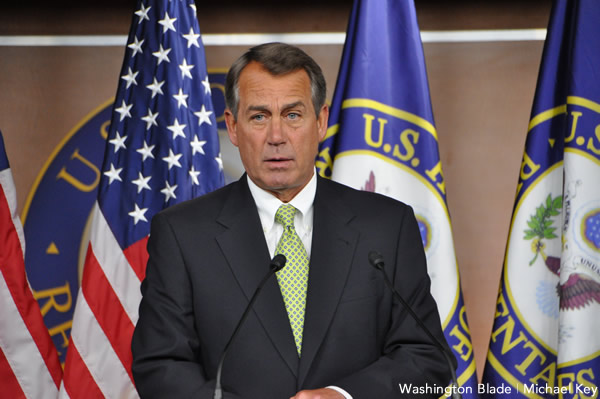Politics
House GOP drops DOMA defense
‘Windsor decision resolves issue of DOMA’s Section 3 constitutionality’


U.S. House Speaker John Boehner has dropped defense of DOMA in court. (Washington Blade file photo by Michael Key).
House Republicans and the U.S. Justice Department are switching roles in a case against the Defense of Marriage Act that continues because it also challenges a statute restricting veterans’ benefits for troops with same-sex spouses.
In a move widely praised by LGBT advocates on Thursday, House Republican lawyers who had previously defended DOMA — including Paul Clement, a former U.S. solicitor general during the Bush administration — announced they would withdraw as a participant in the lawsuit in the wake of the U.S. Supreme Court decision last month in the Windsor case striking down DOMA.
“The Windsor decision necessarily resolves the issue of DOMA’s Section 3 constitutionality in this case,” the filing states. “While the question of whether [Title 38] is constitutional remains open, the House has determined, in light of the Supreme Court’s opinion in Windsor, that it no longer will defend that statute. Accordingly, the House now seeks leave to withdraw as a party defendant.”
The lawsuit, known as McLaughlin v. Panetta, was filed on behalf of gay troops and veterans by Servicemembers Legal Defense Network and Chadbourne & Parke LLP in 2011 and challenges DOMA as well as Title 38, the law governing veterans’ benefits that also restricts the definition of spouse to opposite-sex couples.
LGBT advocates praised the move from House Republicans, who had taken up defense of DOMA after the Obama administration stopped defending it in 2011, as a decision placing them on the right side of history.
Chad Griffin, president of the Human Rights Campaign, called the move “historic,” noting that House Republicans spent an estimated $2.3 million in defense of DOMA.
“After millions of taxpayer dollars wasted defending discrimination, it’s a historic sign of the times that the House leadership is dropping its pointless quest to maintain second-class status for lesbian and gay couples,” Griffin said.
Drew Hammill, a spokesperson for House Minority Leader Nancy Pelosi (D-Calif.), said Republican attorneys should follow suit in other lawsuits related to DOMA and file motions to exit as parties in those cases.
“The Supreme Court’s ruling is clear,” Hammill said “Rather than trying to delay justice for particular married gay and lesbian couples and their families, Speaker Boehner should immediately file motions to end House Republicans’ involvement in the remaining cases and stop spending taxpayer dollars to defend unconstitutional discrimination.”
In addition to the McLaughlin case, another DOMA lawsuit also challenging Title 38 was filed by the Southern Poverty Law Center and is known as Cooper-Harris v. United States.
Caren Short, staff attorney for the Southern Poverty Law Center, called on Republican attorneys to withdraw from the Cooper-Harris case as well.
“We are considering our next steps and hope BLAG will withdraw from the Cooper-Harris case and finally end their shameful crusade against veterans and their spouses,” Short said.
Boehner’s office didn’t respond to a request for comment on whether House Republicans would similarly withdraw from other lawsuits related to DOMA.
But on the same day House Republicans made the filing to withdraw from the McLaughlin case, the Justice Department made its own filing disputing the plaintiffs’ ability to challenge Title 38 in the lawsuit.
First, the Justice Department contests that any of the plaintiffs have been harmed by the statute because it says none of them have applied for and been denied veterans benefits.
“These plaintiffs do not allege that they have applied for or been denied any veterans’ benefits (such as additional disability compensation based on a veteran’s service-connected disability, burial benefits, or dependency and indemnity compensation) that they would be eligible to receive but for their same-sex marriage,” the Justice Department states.
Second, the Obama administration maintains that the court in which the lawsuit was filed doesn’t have jurisdiction to decide veterans’ claims because the Veterans’ Judicial Review Act provides the exclusive review scheme for such challenges.
“Under this scheme, a veteran may seek administrative review of the denial of veterans’ benefits before the Board of Veterans’ Appeals and subsequent judicial review by the Court of Appeals for Veterans Claims, with the right to appeal that court’s decision as to legal issues to the U.S. Court of Appeals for the Federal Circuit and ultimately to the Supreme Court,” the Justice Department said.
The Justice Department makes this filing — signed by gay Acting Assistant Attorney General Stuart Delery — even though the U.S. Attorney General announced in February 2012 that it won’t defend Title 38 in court as it pertains to married same-sex couples.
Although the Justice Department objects to the Title 38 challenge in the case on procedural grounds, the filing makes clear the administration still believes Title 38 is unconstitutional “against challenges under the equal protection component of the Fifth Amendment Due Process Clause.”
Christopher Man, a gay attorney handling the case with Chadbourne & Parke LLP, said he disagrees with the arguments presented by the Obama administration, but will work with the Justice Department going forward.
“We appreciate that DOJ has agreed with us that each of the statutory provisions we challenged is unconstitutional, and are working with DOJ lawyers to find a solution that will provide our plaintiffs with all the benefits they would have received if their application for benefits had not been unconstitutionally denied,” Man said.
U.S. District Judge Richard Stearns had asked both House Republicans and the Justice Department to file by Thursday on the impact of the Windsor case on the McLaughlin case.
Congress
Congress passes ‘Big, Beautiful Bill’ with massive cuts to health insurance coverage
Roughly 1.8 million LGBTQ Americans rely on Medicaid

The “Big, Beautiful Bill” heads to President Donald Trump’s desk following the vote by the Republican majority in the U.S. House of Representatives Thursday, which saw two nays from GOP members and unified opposition from the entire Democratic caucus.
To partially offset the cost of tax breaks that disproportionately favor the wealthy, the bill contains massive cuts to Medicaid and social safety net programs like food assistance for the poor while adding a projected $3.3 billion to the deficit.
Policy wise, the signature legislation of Trump’s second term rolls back clean energy tax credits passed under the Biden-Harris administration while beefing up funding for defense and border security.
Roughly 13 percent of LGBTQ adults in the U.S., about 1.8 million people, rely on Medicaid as their primary health insurer, compared to seven percent of non-LGBTQ adults, according to the UCLA School of Law’s Williams Institute think tank on sexual orientation and gender identities.
In total, the Congressional Budget Office estimates the cuts will cause more than 10 million Americans to lose their coverage under Medicaid and anywhere from three to five million to lose their care under Affordable Care Act marketplace plans.
A number of Republicans in the House and Senate opposed the bill reasoning that they might face political consequences for taking away access to healthcare for, particularly, low-income Americans who rely on Medicaid. Poorer voters flocked to Trump in last year’s presidential election, exit polls show.
A provision that would have blocked the use of federal funds to reimburse medical care for transgender youth was blocked by the Senate Parliamentarian and ultimately struck from the legislation — reportedly after the first trans member of Congress, U.S. Rep. Sarah McBride (D-Del.) and the first lesbian U.S. senator, Tammy Baldwin (D-Wis.), shored up unified opposition to the proposal among Congressional Democrats.
Congress
Ritchie Torres says he is unlikely to run for NY governor
One poll showed gay Democratic congressman nearly tied with Kathy Hochul

Gay Democratic Congressman Ritchie Torres of New York is unlikely to challenge New York Gov. Kathy Hochul (D) in the state’s next gubernatorial race, he said during an appearance Wednesday on MSNBC’s “Morning Joe.”
“I’m unlikely to run for governor,” he said. ““I feel like the assault that we’ve seen on the social safety net in the Bronx is so unprecedented. It’s so overwhelming that I’m going to keep my focus on Washington, D.C.”
Torres and Hochul were nearly tied in a poll this spring of likely Democratic voters in New York City, fueling speculation that the congressman might run. A Siena College poll, however, found Hochul leading with a wider margin.
Back in D.C., the congressman and his colleagues are unified in their opposition to President Donald Trump’s signature legislation, the “Big Beautiful Bill,” which heads back to the House after passing the Senate by one vote this week.
To pay for tax cuts that disproportionately advantage the ultra-wealthy and large corporations, the president and Congressional Republicans have proposed massive cuts to Medicaid and other social programs.
A provision in the Senate version of the bill that would have blocked the use of federal funds to reimburse medical care for transgender youth was blocked by the Senate Parliamentarian and ultimately struck from the legislation, reportedly after pressure from transgender U.S. Rep. Sarah McBride (D-Del.) and lesbian U.S. Sen. Tammy Baldwin (D-Wis.).
Torres on “Morning Joe” said, “The so-called Big Beautiful Bill represents a betrayal of the working people of America and nowhere more so than in the Bronx,” adding, “It’s going to destabilize every health care provider, every hospital.”
Congress
House Democrats oppose Bessent’s removal of SOGI from discrimination complaint forms
Congressional Equality Caucus sharply criticized move

A letter issued last week by a group of House Democrats objects to Treasury Secretary Scott Bessent’s removal of sexual orientation and gender identity as bases for sex discrimination complaints in several Equal Employment Opportunity forms.
Bessent, who is gay, is the highest ranking openly LGBTQ official in American history and the second out Cabinet member next to Pete Buttigieg, who served as transportation secretary during the Biden-Harris administration.
The signatories to the letter include a few out members of Congress, Congressional Equality Caucus chair and co-chairs Mark Takano (Calif.), Ritchie Torres (N.Y.), and Becca Balint (Vt.), along with U.S. Reps. Nikema Williams (Ga.), Hank Johnson (Ga.), Raja Krishnamoorthi (Ill.), Delia Ramirez (Ill.), Joyce Beatty (Ohio), Lloyd Doggett (Texas), Eleanor Holmes Norton (D.C.), Josh Gottheimer (N.J.), and Sylvia Garcia (D-Texas).
The letter explains the “critical role” played by the EEO given the strictures and limits on how federal employees can find recourse for unlawful workplace discrimination — namely, without the ability to file complaints directly with the Employment Opportunity Commission or otherwise engage with the agency unless the complainant “appeal[s] an agency’s decision following the agency’s investigation or request[s] a hearing before an administrative judge.”
“Your attempt to remove ‘gender identity’ and ‘sexual orientation’ as bases for sex discrimination complaints in numerous Equal Employment Opportunity (EEO) forms will create unnecessary hurdles to employees filing EEO complaints and undermine enforcement of federal employee’s nondiscrimination protections,” the members wrote in their letter.
They further explain the legal basis behind LGBTQ inclusive nondiscrimination protections for federal employees in the EEOC’s decisions in Macy v. Holder (2012) and Baldwin v. Foxx (2015) and the U.S. Supreme Court’s decision in Bostock v. Clayton County (2020).
“It appears that these changes may be an attempt by the department to dissuade employees from reporting gender identity and sexual orientation discrimination,” the lawmakers wrote. “Without forms clearly enumerating gender identity and sexual orientation as forms of sex discrimination, the average employee who experiences these forms of discrimination may see these forms and not realize that the discrimination they experienced was unlawful and something that they can report and seek recourse for.”
“A more alarming view would be that the department no longer plans to fulfill its legal obligations to investigate complaints of gender identity and sexual orientation and ensure its
employees are working in an environment free from these forms of discrimination,” they added.



















